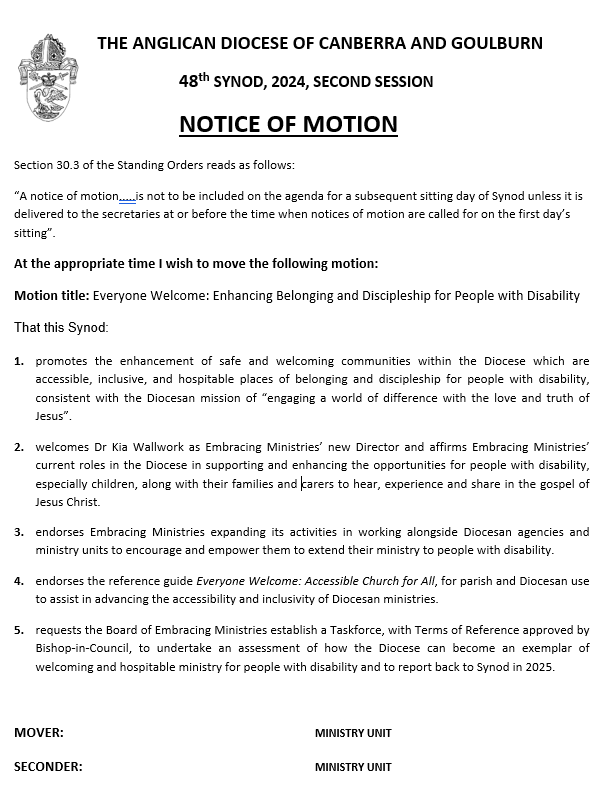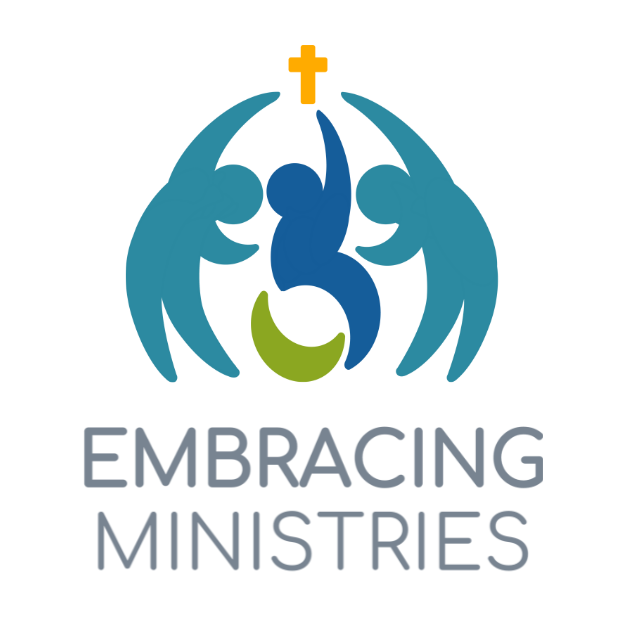Task force
A Task Force of The Board of Embracing Ministries
The core purpose of the Task Force is the enhancement of safe and welcoming communities within the Diocese which are accessible, inclusive, and hospitable places of belonging and discipleship for people with disability, consistent with the Diocesan mission of “engaging a world of difference with the love and truth of Jesus”

Terms of Reference
May we see “a paradigm shift… where our norms and values are aligned with a theological vision of belonging rather than societal views of what is deemed ‘normal’.”
– Armand Léon van Ommen
Department of Divinity and Religious Studies, University of Aberdeen
Context
The Disability Taskforce (herein, the Taskforce) was requested by Synod Motion BC/8 (see APPENDIX 1 for a copy of the motion).
Purpose of the Taskforce
In accordance with the Synod motion, the Board of Embracing Ministries was requested to establish a Taskforce to:
Undertake an assessment of how the Diocese can become an exemplar of welcoming and hospitable ministry for people with disability and to report back to Synod in 2025.
In undertaking this assessment, the Taskforce will hope to encourage “the enhancement of safe and welcoming communities within the Diocese which are accessible, inclusive, and hospitable places of belonging and discipleship for people with disability, consistent with the Diocesan mission of “engaging a world of difference with the love and truth of Jesus”.”
Structure and Members
The Taskforce will be structured as a sub-committee of the existing Embracing Ministries Board.
The Embracing Ministries Board has agreed to contribute up to $20,000 to assist the research and investigatory aims of the Taskforce. It is anticipated this funding may be utilised for a literature review to ascertain best-practice as per the motion, and to undertake quantitative and qualitative aspects of the research.
It will comprise up to 6 members being:
- At least three members of the Embracing Ministries Board
- The Director Embracing Ministries
- Community stakeholders, with lived experience of disability and/or specialist skills and qualifications coopted into the sub-committee
Criteria for membership of the Taskforce are:
- Members of the Canberra Goulburn Diocese
- Any or multiple of the following background: lived experience with a disability, carers, disability advocacy, parish ministry
Taskforce members will be required to comply with Safe Ministry standards including providing two character referees. Membership of the Taskforce is in a voluntary capacity.
Duration & Timeframe
As confirmed by Bishop In Council (BIC) on 18 October 24, expected timeframe for Taskforce:
December 2024 Terms of Reference to be approved at Dec BIC meeting
Feb – Jun 2025 Taskforce to undertake inquiry
- This will include regular interim reporting to the EM Board
July 2025 Taskforce to present final report to EM Board
Aug 2025 Taskforce report to BIC meeting before presentation to Synod
Sep 2025 Report to Synod
Outputs
In undertaking its purpose, the Taskforce will:
- Consult with Parishes, Ministry Units and Diocesan Agencies to provide an assessment of the current state of disability-inclusive practices, thereby identifying strengths, weaknesses, and opportunities and regarding increased accessibility and inclusion for people with disability and report back to Synod 2025. (See below: Strengths Assessment for indicative areas of assessment.)
- Assess the use and uptake of Everyone Welcome: accessible church for all by Dr Louise Gosbell (hereafter, Everyone Welcome) and provide feedback for the augmentation of the Canberra and Goulburn version.
- Collate and communicate best practice and associated resources for improvement of accessibility to the gospel and inclusion of people with disabilities in the worshipping community.
- Include a report on the interim progress of inclusive ministry polit projects being undertaken in parishes during the consultation period. A final report on the progress of the pilot parishes will be collated and provided at Synod in 2026.
Strengths Assessment of Diocese
The Strengths Assessment will consider:
- Whether current or planned programs are accessible to people with a disability (e.g. in-house developed program, Messy Church, Youth Group, Mainly Music, etc.)
- Any current or planned programs with the specific aim of active inclusion and programs for people with disability: ( e.g. Youth Group for neurodivergent teens, Carer support, etc.)
- Target age(s)
- Any specific disability catered for
- Steps taken to develop program: roles, committee, changes, strategy, theology statement, etc.
- Physical facilities: accessible (e.g. ramp, toilet, hearing loop, large print, sensory spaces/resources, etc.) and barriers known.
- Resources used (e.g. Luke 14, etc.)
- Help needed, risks, threats.
A Brief Statement of the Core Principles Guiding the Taskforce to Enhance the Participation of People with Disability in the Life of the Church
Our Terms of Reference
“Undertake an assessment of how the Diocese can become an exemplar of welcoming and
hospitable ministry for people with disability and to report back to Synod…
In undertaking this assessment, the Taskforce will hope to encourage “the enhancement of safe and welcoming communities within the Diocese which are accessible, inclusive, and hospitable places of belonging and discipleship for people with disability, consistent with the Diocesan mission of “engaging a world of difference with the love and truth of Jesus”.”
Our Principles
- We accept the United Nations Convention for the Rights of People with Disabilities definition of people with disabilities: “Persons with disabilities include those who have long term physical, mental, intellectual or sensory impairments which in interaction with various barriers may hinder their full and effective participation in society (Church) on an equal basis with others” noting that this definition is reflected by the World Health Organisation and in Australian legislation including the NDIS Act and the Disability Discrimination Act.
- We recognise that people with disability are found across all parts of the Australian community, across all ages, ethnicities and genders and that disability takes many forms including physical, sensory and psycho-social (including neuro diversity in all its forms, cognitive impairment and emotional and mental health issues). Within and across each of these it can exist across a spectrum from profound disabilities (sometimes cumulative) to milder conditions.
- We also recognise that there can be intersectional discrimination against people with disabilities – for example where public attitudes to particular ethnicities or age groups intersect with a person having one of those characteristics as well possessing a disability(ies).
- We recognise the importance of the three prevailing and complementary secular models of disability – the medical which focuses on diagnosing why individuals have core activity limitations and addressing how their abilities might be improved at the individual level, the social which recognises that society erects physical, communication, social and attitudinal barriers to the full inclusion and participation of people with disabilities in all aspects of society, and the human rights model which emphasises the rights of all disabled to participate in a rich and dignified life within society, free of discrimination. While understanding the value of these models we aim to position them within a Christian framework of the meaning and importance of disability.
- We welcome the elevation of Embracing Ministries to full Agency status within the Diocese.
- We do not support any reduction of the resources devoted by Embracing Ministries to the outstanding work it does with young people.
- Our aim is that Engaging Ministries receives additional resources to take on the supportive and enabling role with the Diocese’s Parishes and Agencies to encourage the enhancement of safe and welcoming communities within the Diocese which are accessible, inclusive, and hospitable places of belonging and discipleship for all people with disability, consistent with the Diocesan mission of “engaging a world of difference with the love and truth of Jesus”. This is consistent with its new ordinance.
- We don’t support any approach which pits different groups of people with disabilities against each other – declaring some to be more important or more “real” than others. None in our Christian life is more worthy than another.
- We value the important contribution that Everyone Welcome has already made and will continue to make to our objectives.
Taskforce to Enhance the Participation of People with Disability in the Life of the Anglican Diocese of Canberra and Goulburn
Canberra ACT
24 April 2025
